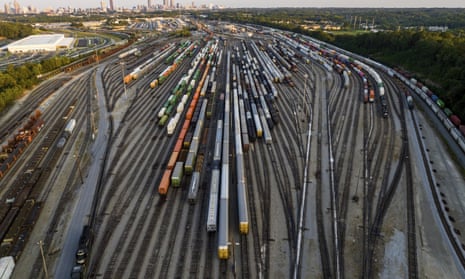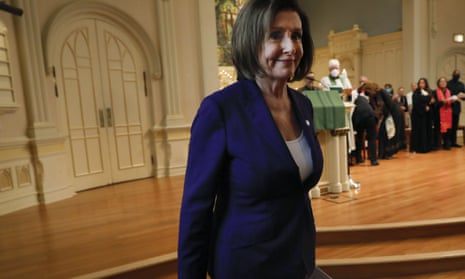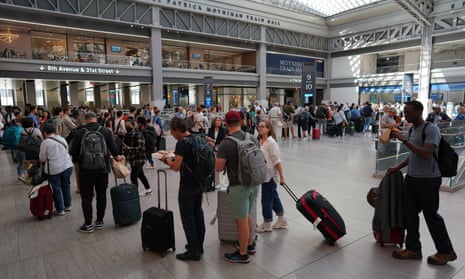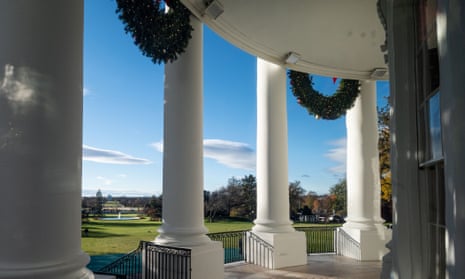Biden at loggerheads with unions over push to stop rail strike
Joe Biden has urged the US Congress to intervene to prevent the rail strike that is looming across America and could bring passenger and freight trains screeching to a halt as early as next week.
The US president warns that a rail strike will put more than three quarters of a million Americans out of work very quickly – and one expert analysis estimates it would cost the economy $1bn in the first week.
But asking Congress to force through a tentative agreement reached in September that’s supported by some – but very much not by all – the rail unions involved puts him at loggerheads with organized labor in the US.
That goes sharply against his track record as a vociferous supporter of unions through thick and thin over decades and a reputation as perhaps the most pro-labor president in US history.
House Speaker Nancy Pelosi will support action from Congress, to avert strikes from December 9, while House majority leader Chuck Schumer has not placed his cards down yet. Labor secretary Marty Walsh helped mediate negotiations between rail companies and unions earlier in the fall. Four key unions refused to sign up.
Will Vermont’s socialist and independent US Senator Bernie Sanders, who caucuses with the Democrats, support a government-imposed resolution?
At this critical moment for our economy, in the holiday season, we cannot hurl the U.S. into a devastating rail freight shutdown.
Congress should get this bill to my desk as soon as possible so we can avoid disruption.
— President Biden (@POTUS) November 29, 2022
Key events
Talking up labor unions as a senator or a candidate or when you’re president and opening a factory is one thing but facing a national rail strike as the festive seasons looms is quite another – especially for Joe Biden.
Here’s some interesting perspective directly from Politico. The outlet writes in this morning’s, Politico Playbook dispatch from the front lines in Washington:
In 1992, two days into a crippling railroad strike, then-Senator Joe Biden came to the Senate floor and decried the lopsided nature of federal labor laws dealing with the rail industry – laws, he argued, that essentially allowed corporations, regulators and, ultimately, Congress to run roughshod over workers.
“We need to restore a measure of balance to these negotiations,” he said, before voting with just five other senators against halting the strike.
Thirty years later, as president, Biden is turning to those very same laws to prevent another strike and impose a tentative contract agreement that his administration brokered but multiple rail unions voted to reject.
“As a proud pro-labor president, I am reluctant to override the ratification procedures and the views of those who voted against the agreement,” the president said in a statement. “But in this case – where the economic impact of a shutdown would hurt millions of other working people and families – I believe Congress must use its powers to adopt this deal.”
Translation: It’s a lot easier to be “Union Joe” as one senator among 100 than it is as president of the United States – especially during holiday shopping season and a persistent bout of inflation.
People familiar with the process told us last night that Biden and his advisers determined that the risk to the economy was just too great. A strike would disrupt supply chains – including such critical goods as motor fuels and water treatment chemicals – and could ultimately cost the U.S. economy $1 billion within a week, according to analysis from the Anderson Economic Group …
… Until Monday, administration officials remained engaged in resolving the dispute. But Biden [he was advised by Cabinet folks that] there is no path to resolve the dispute at the bargaining table and recommended he ask Congress to impose the September deal …
… One former [unnamed] labor department official told Politico:
There is a sentiment among some railroad workers that they thought the president was going to absolutely battle all the way to the end to get them exactly what they wanted. He’s going to have some unhappy people. I think there’s going to be some grumbling in the labor movement.”
The former official was hopeful that Biden’s pro-union history couldn’t and wouldn’t be overshadowed by this one decision. That remains to be seen.

Workers in four unions, including the largest, have rejected the tentative rail industry deal, while workers in eight unions have approved it, Reuters’ reporting continues.
Labor Secretary Marty Walsh, Transportation Secretary Pete Buttigieg and Agriculture Secretary Tom Vilsack have been involved in discussions with the rail industry, unions and agriculture industry stakeholders.

Senator Roger Wicker, the top Republican on the commerce committee, praised Biden’s call to Congress to act and said no one side was fully happy with the compromise contract deal “but the responsible thing to do is avoid the strike.”
The Association of American Railroads said “congressional action to prevent a work stoppage in this manner is appropriate … No one benefits from a rail work stoppage – not our customers, not rail employees and not the American economy.”
In a letter yesterday, the US Chamber of Commerce, National Association of Manufacturers, National Retail Federation, American Petroleum Institute, National Restaurant Association, American Trucking Associations and other groups warned that impacts of a potential strike could be felt as soon as 5 December.
Biden said Congress
Should set aside politics and partisan division and deliver for the American people. Congress should get this bill to my desk well in advance of December 9th so we can avoid disruption.”
The letter to congressional leaders, first reported by Reuters, warned that a strike could halt passenger railroad Amtrak and commuter rail services that “would disrupt up to 7 million travelers a day”.
It added:
The risks to our nation’s economy and communities simply make a national rail strike unacceptable.”
Biden’s Presidential Emergency Board in August released the framework for the tentative deal forged in September between major railroads and a dozen unions representing 115,000 workers. Those carriers include Union Pacific, Berkshire Hathaway Inc’s BNSF, CSX, Norfolk Southern and Kansas City Southern. Unions and railroads have until Dec. 9 to resolve differences. If they do not, workers could strike or railroads could lock out employees – unless Congress intervenes. But railroads would halt hazardous materials shipments at least four days ahead of a strike deadline.
Joe Biden last night called on Congress to intervene to avert a potential rail strike that could occur as early as 9 December, warning of a catastrophic economic impact if railroad service ground to a halt, Reuters writes.
Biden asked lawmakers to adopt the tentative deal announced in September “without any modifications or delay – to avert a potentially crippling national rail shutdown” and added that up to 765,000 Americans “could be put out of work in the first two weeks alone.”
Speaker Nancy Pelosi said lawmakers would take up legislation this week “to prevent a catastrophic nationwide rail strike, which would grind our economy to a halt”.

Yesterday, more than 400 groups called on Congress to intervene in the railroad labor standoff that threatens to idle shipments of food and fuel and strand travelers while inflicting billions of dollars of economic damage.
A rail traffic stoppage could freeze almost 30% of US cargo shipments by weight, stoke inflation and cost the American economy as much as $2bn a day by unleashing a cascade of transport woes affecting US energy, agriculture, manufacturing, healthcare and retail sectors.
A rail shutdown would devastate our economy. Without freight rail, many U.S. industries would shut down … Communities could lose access to chemicals necessary to ensure clean drinking water. Farms and ranches across the country could be unable to feed their livestock,” Joe Biden said in a statement last night.
The president hailed the contract deal that includes a 24% compounded wage increase over a five-year period from 2020 through 2024 and five annual $1,000 lump-sum payments.

Joe Biden is convening congressional leaders to discuss legislative priorities through the end of the year, according to the White House.
There are no further details yet from a snap report from the Reuters news agency but we’ll bring you the news as it develops.
The urgent rail industry matter notwithstanding, our Washington colleague Lauren Gambino examines what the still-Democratic controlled Congress can get done in this “lame duck” session before Republicans take charge of the House with a slim majority early next year.
Lauren writes that: As a new era of divided government looms in the US, Democrats are rushing to complete a lengthy legislative to-do list that includes landmark civil liberties legislation, a routine but critical spending package and a bill to prevent another January 6.
There are only a handful of working days left before the balance of power in Congress shifts and Democrats’ unified control of government in Washington ends. In January, Republicans will claim the gavel in the House, giving them veto power over much of Joe Biden’s agenda.
You can read the rest of her analysis report here.

Biden at loggerheads with unions over push to stop rail strike
Joe Biden has urged the US Congress to intervene to prevent the rail strike that is looming across America and could bring passenger and freight trains screeching to a halt as early as next week.
The US president warns that a rail strike will put more than three quarters of a million Americans out of work very quickly – and one expert analysis estimates it would cost the economy $1bn in the first week.
But asking Congress to force through a tentative agreement reached in September that’s supported by some – but very much not by all – the rail unions involved puts him at loggerheads with organized labor in the US.
That goes sharply against his track record as a vociferous supporter of unions through thick and thin over decades and a reputation as perhaps the most pro-labor president in US history.
House Speaker Nancy Pelosi will support action from Congress, to avert strikes from December 9, while House majority leader Chuck Schumer has not placed his cards down yet. Labor secretary Marty Walsh helped mediate negotiations between rail companies and unions earlier in the fall. Four key unions refused to sign up.
Will Vermont’s socialist and independent US Senator Bernie Sanders, who caucuses with the Democrats, support a government-imposed resolution?
At this critical moment for our economy, in the holiday season, we cannot hurl the U.S. into a devastating rail freight shutdown.
Congress should get this bill to my desk as soon as possible so we can avoid disruption.
— President Biden (@POTUS) November 29, 2022
Biden clashes with unions as he urges Congress to derail train strike
Good Morning, US politics live blog readers, the White House is a hive of activity, it’s early voting a go-go in Georgia and there’s a lively day in store on Capitol Hill, so stay with us for all the news as it happens.
Here’s what afoot:
-
Joe Biden has always championed labor unions in America, whether fashionable or not, but now that he’s president he’s staring at a holiday-season rail strike that he says threatens the economy – and he’s urged Congress to intervene and prevent it by imposing a deal some unions hate.
-
The US president is traveling to Michigan today to tour a semiconductor facility as he seeks to promote his agenda, especially in swing states, of boosting manufacturing in the US and his stewardship of the economy.
-
More than 400,000 voters have already cast their ballots since early voting began in the Georgia midterms run-off for the US Senate seat held since the 2020 election by Democrat Raphael Warnock. He’s neck-and-neck with Republican challenger Herschel Walker. The election’s next Tuesday.
-
Mike Lindell, he of foamy pillows and foaming-at-the-mouth promotion of the lie that Donald Trump won the 2020 presidential election, is running to become the chair of the Republican National Committee (RNC).
-
Mitt Romney has compared Trump to a gargoyle.


